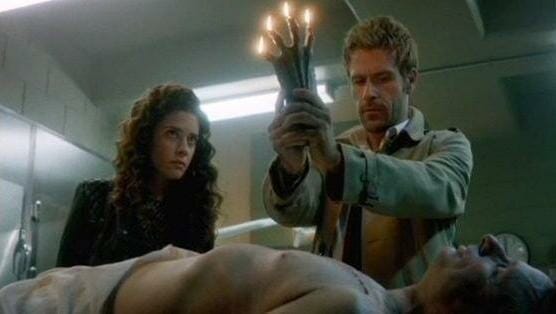Constantine: “The Devil’s Vinyl”
(Episode 1.03)

Episode titles are rarely so literal as “The Devil’s Vinyl,” which is pretty much about a piece of vinyl owned by the devil—well, an acetate, anyway. And I suppose that technically, “the devil” isn’t exactly the correct nomenclature either—this is “The First of the Fallen.” Those who are familiar with the Constantine source material from Hellblazer comics will know that The First is a major antagonist over the course of the whole comic series, so it’s actually pretty cool to see him get name dropped so early in the run of Constantine, especially when there’s no shortage of lesser baddies for the British warlock to run up against. The First doesn’t actually appear in “The Devil’s Vinyl,” but that’s fine—the audience sees all too well the destruction his presence (in the form of his recorded “voice”) can wreak.
As examined in last week’s episode, “The Darkness Beneath,” Constantine has become a sort of road-tripping paranormal procedural—a gritty, would-be X-Files with much more overtly supernatural goings-on and (so far) fairly little focus on a central plot. We’re three episodes in, and each has featured an almost entirely self-contained story, this one falling somewhere between the first and second in terms of quality and engagement. Constantine himself literally refers to their journeys as dousing “spiritual brush fires” where they crop up, and this week our setting is the south side of Chicago.
Constantine is pretty plot-heavy, and quite a lot gets packed into “The Devil’s Vinyl.” The macguffin of the episode is an actual acetate record made by a legendary blues performer who sold his soul to The First of the Fallen. When The First comes to collect during a recording, a horrible record of the events is left on the acetate, which possesses and/or kills anyone who picks it up or listens to it. We learn all this from an aged record producer on his deathbed, which seems to be the sort of character who’s cropping up in Constantine all the time: Pure exposition machines who meet a stranger (our lead characters), and then unload decades of secrets on them in exchange for nothing, with little to no convincing. The show doesn’t seem to have time to dawdle, which makes such free exchange of information a necessity, as impractically silly as it may be.
-

-

-

-

-

-

-

-

-

-

-

-

-

-

-

-

-

-

-

-

-

-

-

-

-

-

-

-

-

-

-

-

-

-

-

-

-

-

-

-








































